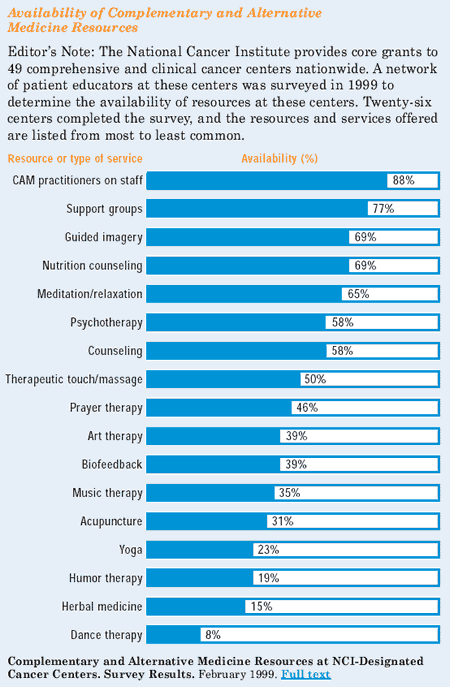| You
are here: Home: BCU 4|2001: Section 7

Section 7
Complementary and Alternative
Medicine
COMPLEMENTARY
MODALITIES
This really is an extension and elaboration of something we’ve
always had in cancer medicine,and that is supportive care —
the quality-of-life arm of cancer treatment. Patients are looking
for something that they can do on their own to help themselves.
Anyone is free
to walk into a health food store and roam the shelves and select
anything they like, and it gives them a real sense of participation
in their own care and a sense of control.
In an indirect
way, oncologists can have a profound effect on this, giving patients
something that they can do in the form of a good complementary modality
or, for example, recommending that they watch their diet in certain
ways to keep the fat lower,etc. When patients feel helpless —
as though they can’t contribute to their own health —
they have a much greater tendency to look for other things that
they can do on their own.
Oncologists
tend to focus on treating the tumor, and that’s obviously the
most important thing to do. At the same time,patients and family
members have tremendous needs. They have physical needs, all kinds
of symptoms that need to be controlled — and a host of psychological
needs. And we have to pay more attention to those. It’s not
feasible for oncologists in practice to do all of this, but they
can surround themselves with colleagues and others who can provide
those services.
Right now, a
majority of clinical and comprehensive cancer centers offer some
degree of complementary medicine. It may be only a part-time practitioner
who comes in to do music therapy or massage once a week, or it could
be something much more full-blown. But they are either developing
or already have something resembling a complementary medicine program.
—Barrie
Cassileth, PhD

Page
2 of 3
Back | Next
|
